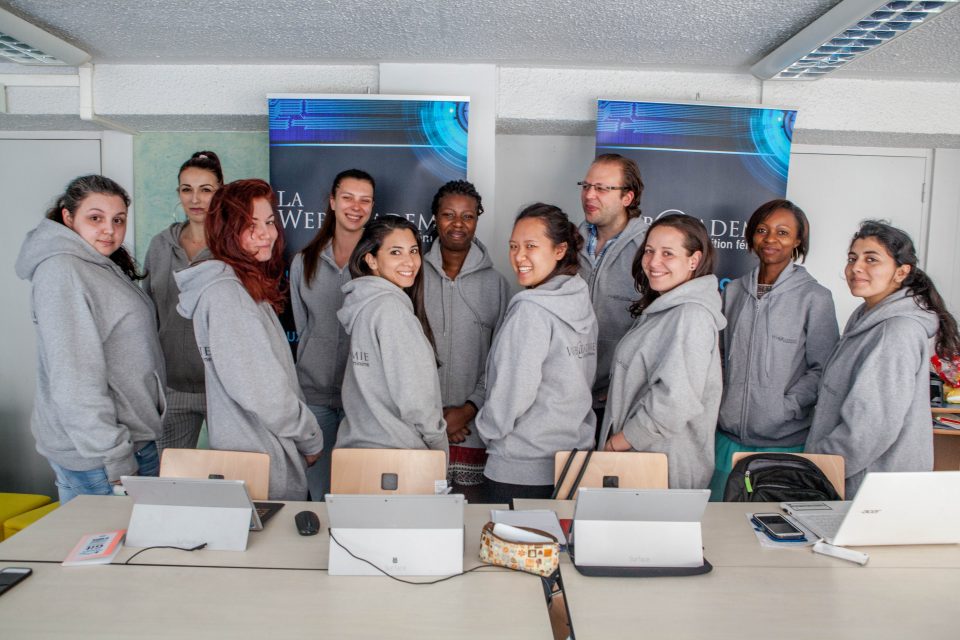Most of us have heard – and heed – the advice to live life without regret. After all, time never stands still, so it seems only sensible to avoid being stuck in what could have been.
But, what if we had a second chance? An opportunity to hit refresh. For young students in France wishing they never dropped out of school, Web@cadémie is helping turn back the clock.
Founded by non-profit ZUPdeCO in 2010, and empowered by Epitech, the Paris-based school provides free computer programming courses for some of France’s most underserved youth to help them certify as web developers. With France’s Government estimating more than 98,000 young people leave school without a diploma or qualification, Web@cadémie’s Director, Sophie Viger, recognized the urgent need to re-engage these kids – particularly girls – in order to prevent them from ‘falling through the cracks.’
“With so many young people not finishing their education, it’s no surprise almost a quarter of France’s youth is unemployed,” says Sophie. “Because it’s such a complex issue, with many variables as to why a student leaves school, it’s hard to know where to start. For Web@cadémie, our focus is reinvigorating the imaginations of those who have dropped out of school, and helping them graduate to become part of France’s future workforce.”
However, in helping students join the workforce, Sophie says it is equally vital Web@cadémie does not fuel a different societal issue, which is the underrepresentation of women working in science, technology, engineering and math (STEM).
“It goes without saying the number of women working in STEM-related fields across France is low. So, while we’ve worked tirelessly to empower all of our students with the digital skills they need to seize future job opportunities – we work exceptionally hard to attract girls to our programs and increase the number of young women entering France’s tech talent pipeline.”
In partnership ZUPdeCO, Microsoft has pushed forward with a number of initiatives ranging from Digigirlz hackathons, hosting an Hour of Code, and signing the UN Charter for Women in order to bolster the number of girls in STEM.
Of all the Web@cadémie’s initiatives, Sophie says its pioneering ‘Women’s Ambition’ class is what she’s most proud of: “Despite all the talk around digital being a growth sector, women still make up a tiny proportion of the workforce and this ‘digital divide’ will only get bigger as jobs across every sector require technology skills.”
“We wanted to move beyond raising awareness, so we took a decisive step to invert our recruitment proportions and commit to having 80 per cent of our students be female – as a minimum. The very first pilot exceeded our expectations, with 19 girls enrolling out of 23 applicants, proving girls have a genuine interest in computer science if given the chance.”
According to new Microsoft research, ‘creativity’ has been identified as the link in encouraging European girls to pursue careers in STEM. ZUPdeCO founder Francois-Afif Benthanane couldn’t agree more: “If digital skills are an engine for opportunity, then creativity is the fuel that runs it. We’re convinced our creative approach to teaching computer science is what attracts so many girls to our schools, which in turn, has helped them grow and adapt to an ever-changing global job market.”
“With 94 percent of our graduates gaining employment or continuing studies, our second chance schools set the benchmark and ultimately inspired parts of the French Government’s La grande école du numérique initiative. Last year, former-President Hollande visited Web@cadémie and announced his government would provide young people across France with more than 400 free courses tailored to help them gain qualifications for tomorrow’s digital workforce.”
Inspired by Web@cadémie’s work in bridging the digital divide? Why not try an Hour of Code this Computer Science Education Week 4th – 10th December 2017. For more information on how Microsoft is helping today’s youth get ready for the future, visit our new Digital Skills website.




